
- Shandong Loyal Industrial Co.,Ltd.
- SHORT-CUT PASTA PRODUCTION LINE LONG-CUT PASTA PRODUCTION LINE INSTANT PASTA PRODUCTION LINE
Home> Application> Fully Automated Macaroni Making Machine: Enhancing Efficiency and Energy Savings

Fully Automated Macaroni Making Machine: Enhancing Efficiency and Energy Savings
Macaroni making machines have become indispensable in the modern food industry, revolutionizing the way pasta is produced. The demand for efficient and energy-saving solutions has led to the development of fully automated macaroni pasta production line. In this article, we delve into the significance of these machines and explore how they enhance efficiency and contribute to energy savings.Shandong Loyal Industrial Co., Ltd. has incorporated advanced technologies from Germany's Buhler and Italy's GEA in the production of its macaroni

Technological Advancements in Macaroni Making
Traditionally, macaroni making involved labor-intensive processes. However, with technological advancements, the landscape has evolved. From manual kneading and shaping to automated extrusion and cutting, the journey of macaroni making technology has been transformative. The fully automated macaroni making machine represents the pinnacle of this evolution, offering features that not only streamline the process but also elevate the overall efficiency and energy conservation.
Key Components of a Fully Automated Macaroni Making Machine
Understanding the intricacies of a fully automated macaroni making machine is crucial to appreciate its impact. This section explores the essential components, highlighting the cutting-edge automation technology employed. The emphasis is on elucidating how these components synergistically contribute to efficiency and energy savings, making them integral to the success of the machine.

Operational Efficiency
One of the defining aspects of a fully automated macaroni making machine is its operational efficiency. The speed and precision achieved through automation surpass traditional methods. A comparative analysis with manual and semi-automated processes underscores the remarkable increase in production rates and a simultaneous reduction in operational costs. Real-world examples further substantiate the transformative impact on pasta production.
Energy Conservation Measures
Efforts to address environmental concerns have driven the integration of energy-efficient features in macaroni making machines. This section discusses the specific measures taken to reduce energy consumption. An in-depth analysis explores how automation, beyond enhancing efficiency, plays a pivotal role in contributing to sustainability and environmental conservation.
Case Studies
The real-world application of fully automated macaroni making machines comes to life in this section. Case studies showcase successful implementations across the industry, accompanied by testimonials from industry experts and businesses that have embraced this technology. These stories provide concrete evidence of the positive outcomes, reinforcing the value of automation in macaroni production.
Future Trends and Innovations
As technology advances, so does the potential for innovation in macaroni making. This section explores emerging trends and predictions for the future of fully automated systems in the food processing industry. By staying ahead of the curve, businesses can position themselves to harness the benefits of forthcoming technological advancements.
Conclusion
In conclusion, the benefits of fully automated macaroni making machines are multifaceted. Summarizing the advancements discussed throughout the article, it is evident that these machines not only enhance efficiency but also contribute significantly to energy savings. The call to action echoes the need for businesses to consider adopting this transformative technology, ensuring a competitive edge in the dynamic landscape of pasta production.

FAQs: Common Questions About Macaroni Making Machines
As businesses and individuals explore the integration of fully automated macaroni making machines into their operations, it's natural to have questions. Here, we address common queries to provide a comprehensive understanding of this innovative technology.
Q1: How does a fully automated macaroni making machine differ from traditional methods?
A1: Traditional macaroni making involves manual labor at various stages, from dough preparation to shaping. In contrast, a fully automated macaroni making machine streamlines the entire process through advanced technology. Automation replaces manual tasks, ensuring precision, speed, and consistent quality in every batch.
Q2: What are the key components that make a macaroni making machine fully automated?
A2: The key components of a fully automated macaroni making machine include an automated dough mixer, extruder, cutter, and drying system. These components work seamlessly together, controlled by advanced software, to eliminate the need for human intervention in the production process.
Q3: How does a fully automated macaroni making machine contribute to efficiency?
A3: Operational efficiency is a hallmark of fully automated macaroni making machines. The automation of repetitive tasks reduces production time, increases output, and minimizes the margin of error. The result is a more efficient and streamlined macaroni production process.
Q4: Can businesses customize the macaroni shapes using automated machines?
A4: Yes, one of the advantages of fully automated macaroni making machines is the ability to customize pasta shapes. The machines come equipped with versatile extrusion and cutting technologies, allowing businesses to create a wide range of macaroni shapes to meet market demands.
Q5: How do fully automated macaroni making machines contribute to energy savings?
A5: Energy conservation measures are integrated into the design of these machines. Efficient motor systems, optimized production cycles, and advanced insulation technologies contribute to reduced energy consumption. Businesses adopting fully automated systems can experience both operational and environmental benefits.
Q6: Are there notable brands that have successfully implemented automated macaroni making?
A6: Several well-known brands in the pasta industry, including Barilla, De Cecco, Creamette, San Giorgio, and Great Value, have embraced fully automated macaroni making machines. Their success stories serve as benchmarks for the industry, highlighting the positive impact on production efficiency and product quality.
Q7: What does the future hold for automated macaroni making technology?
A7: The future of automated macaroni making technology is promising. Innovations such as artificial intelligence integration, predictive maintenance, and enhanced customization capabilities are anticipated. Businesses should stay abreast of these trends to remain competitive and capitalize on future advancements
Contact Us

- Shandong Loyal Industrial Co.,Ltd.
- Telephone+86 13176674591
- Email[email protected]
- WhatsApp+86 13176674591
- WeChat13176674591
- AddressC623, Jiahui Global Plaza, No. 548, Beiyuan Street, Tianqiao District, Jinan City, Shandong Province
- Factory AddressADD -300m North of Zhangxia Industrial Park, Binhe Road, Zhangxia Town, Changqing District, Jinan
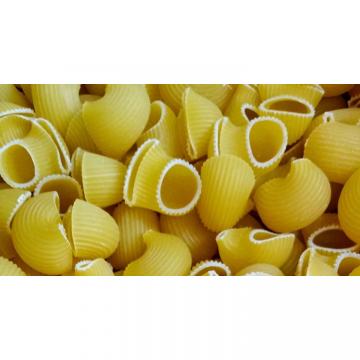

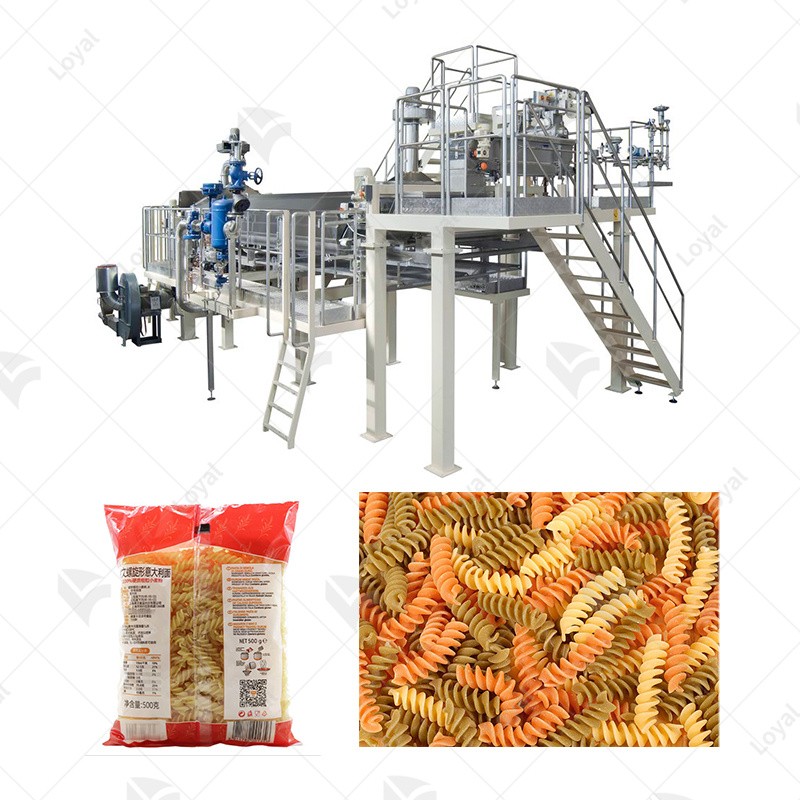

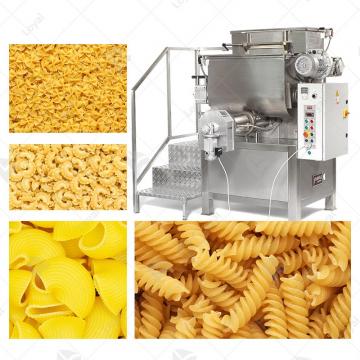
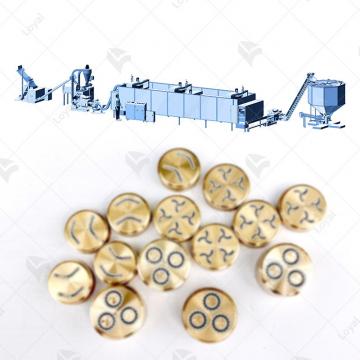 Pasta Processing Equipment
Pasta Processing Equipment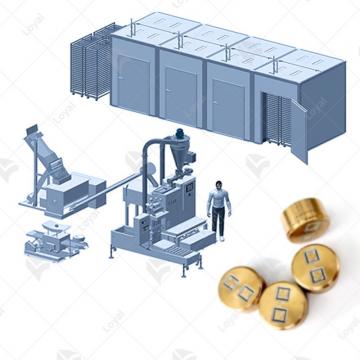 Combined Pasta Machine
Combined Pasta Machine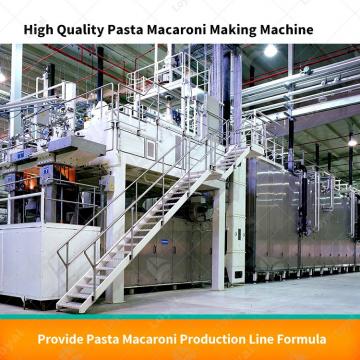 DRY PASTA PRESS MACHINE
DRY PASTA PRESS MACHINE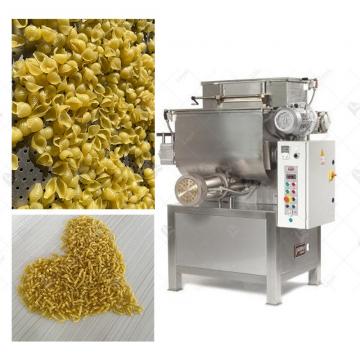 PRECOOKED PASTA PRODUCTION LINE
PRECOOKED PASTA PRODUCTION LINE